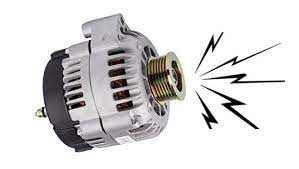Alternators are a core component of your car’s electrical system, and they’re a big part of why your engine is able to start up and run. They generate electricity to run the vehicle’s electrical system and charge the battery.
But sometimes, alternators can make noise. Sometimes even loud ones. It can be scary to think about what that means for your car, but it’s actually not as bad as it sounds.
If you hear an alternator making noise, it could be because of many different things:
You have a bad battery cable or connection somewhere on your vehicle. If this happens, you’ll need to have the problem fixed by a professional mechanic before you can drive safely again.
The alternator belt has slipped off its pulley or sheared off entirely (or something similar). This will cause immediate problems with your vehicle starting up properly, so if this happens, get help immediately!
The alternator bearings are worn out or broken down completely; this will cause loud noises when starting up or running at highway speeds (60+ mph). Again—get help right away if this happens!
Do Alternators make noise?
Alternators that are in good working condition do not make noises. The alternator is responsible for providing power to the vehicle’s electrical system, while also charging the battery.
If you hear a loud noise coming from your engine compartment, it could be a sign of trouble with your alternator.
There are a few different types of noises that can emanate from your vehicle’s engine compartment, including:
A screeching sound, which can be caused by something rubbing against metal or plastic;
A humming noise, which could indicate that the belt that connects the alternator to the engine is loose or worn; or
A high-pitched screeching sound, which may mean that there is an obstruction in place that prevents proper lubrication between moving parts.
Belt-related noises
Alternators make noise when the belt that spins the alternator wears down to the point of breaking and slipping. When this happens, you’ll hear a clicking or grinding sound from your engine compartment.
You might notice this sound when you’re accelerating, or if you’re driving on a hill. The alternator is responsible for powering most of your vehicle’s electrical systems, so if it breaks down and stops spinning, you’ll notice immediately.
Bearing-related noises
When bearings start to wear out, they can cause all kinds of problems, including squeaking and grinding noises. The best way to fix these problems is by replacing the bearings with new ones that are compatible with your alternator.
Whining or grinding sound
If your vehicle is making a whining or grinding sound while you’re driving, it could be a sign that your alternator needs to be replaced.
Alternators are responsible for regulating the flow of electricity within a car’s electrical system. Worn alternators can produce a whining or grinding sound when they’re unable to keep up with the power demands of the engine and other components.
A worn-out alternator is also more likely to fail completely, which means that your car won’t have any power at all. This can cause a variety of problems, including reduced gas mileage and engine performance issues.
What to Do When the Alternator Is Making Noise.
If you’re hearing a humming sound from your alternator, don’t freak out! There are a few things that can be causing this problem, and most of them are pretty easy to fix.
Here are some things to keep in mind when troubleshooting an alternator that’s making noise:
First, make sure the noise is coming from your alternator and not somewhere else in the car (like a fan belt). If you hear it when you’re driving but not when you’re sitting still, then it’s probably coming from the alternator.
You’ll also know it’s coming from there if you see sparks or smoke coming from underneath your hood.
Second, check if anything is loose around where your battery is located. If something is rattling around in there and causing noise while driving then it could be due to wear and tear over time which could lead to malfunctioning parts later down the road so keep an eye out for loose pieces too!
Conclusion
Yes, alternators make noise. The sound is similar to a car engine running, and it gets louder as the alternator becomes more worn out. If you hear this noise when your engine is running, it’s a sign that your alternator needs to be replaced.


